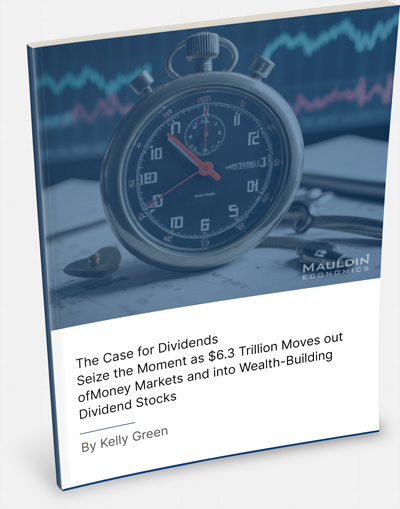
Poor Earnings Release… Time to Panic?
-
 Kelly Green
Kelly Green
- |
- August 9, 2023
- |
- Comments
It’s earnings season, and I find myself tied to my computer, looking through numbers until I feel dizzy. No matter what industry or type of stock I look at, one thing is certain: It’s not all sunshine and roses.
The past three years have forced many companies to think long and hard about the future of their businesses. “Adapt or fail” has become clear to many management teams.
I’m not saying this to be all doom and gloom. It’s the opposite…
There are great opportunities in volatility. I’ve managed to lock in yields that I never thought I would see from giant stalwarts. And it’s all because of companies going through one thing or another right now.
So today, I want to look at some common “negative remarks” that you might see and why you might want to take a closer look before panicking.
A Company Is Down Compared to the Same Quarter Last Year
As of now, eight of the 11 S&P 500 sectors are reporting year-over-year earnings growth. Energy, materials, and healthcare are not looking so hot. But we know all three of these sectors are integral to life as we know it and likely not going anywhere.
Looking at the sector level does help get an overall view, but it’s more important to look at each company individually.
It’s not always a terrible thing if a company has lower revenue or earnings than last year. This is especially true if a company is going through some sort of transition.
AbbVie Inc. (ABBV) is a great example right now. This is the first year that the company is seeing biosimilars (generics) for its blockbuster drug Humira. It’s been one of the world’s top-selling drugs for over two decades, so of course, there’s going to be an effect on ABBV’s 2023 numbers.
Instead of just looking at the year-over-year comparison, AbbVie would require a deeper dive to decide if its progress toward the future makes it a good holding.
Comparing a quarter to the same quarter last year might not work if the company has divested part of the business. It also might be skewed if the company had an abnormally great previous year. At first glance, it looks like the company is doing worse, but in reality, it’s just back to normal.
A Company Misses Earnings or Revenues
This is a phrase that is common in the financial media during earnings season. Really, it has less to do with the company and more to do with analyst expectations.
When a company misses on earnings or revenues, it means that those numbers came in under the analyst consensus. The opposite is called an earnings beat. Either way, it’s based on analysts’ opinions.
If you see this, it’s important to look at what group of analysts the comparison is based on. Some websites use their own group of analysts, and some use a broader group of Wall Street analysts.
I rarely factor this into my analysis as a standalone data point. Instead, I want to hear how a company’s management justifies its numbers. If I hear a lot of excuses without a plan for improvement, this is a red flag.
Like what you're reading?
Get this free newsletter in your inbox every Wednesday! Read our privacy policy here.
A Company Revises Guidance
Just like with analyst expectations, we can see guidance move up or down.
If you’re not familiar with the term “guidance,” this is just management’s expectation for future quarters. Sometimes it’s quarterly, but generally, management teams issue these for the full year.
So far this quarter, I’ve seen a lot of companies raise their full-year guidance. This could mean two things. One, it could mean that the first half of the year is exceeding the management’s expectations. Second, it could mean that the company gave low expectations, to begin with.
I have seen a few instances of lowered full-year guidance. In these cases, management is usually expecting a catalyst either in the macroeconomy or in consumer habits, and it just doesn’t come at the predicted time.
Revisions in either direction are, again, an opportunity to check in with the remarks on the earnings call. Look at the reasons given. They should make sense and not seem like empty excuses.
It’s important to remember that most companies are in a transitional period right now. Many companies are looking for their post-COVID new normal. It’s a clear red flag if a company is ignoring the uncertainties in the macroeconomy right now.
If you have long-term convictions about a company, use these negative news days to grab a few extra shares at a lower price. This will lower your cost basis on your overall trade and increase your collected yield.
For more income now and in the future,

Kelly Green

 Kelly Green
Kelly Green
